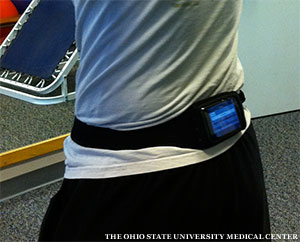
"Sit up straight." "Don't slouch."
Enough already, right?
Whether you are a baseball pitcher or a software programmer sitting in front of a computer, bad posture is one of your worst enemies. It's a symptom of core weakness, and research shows that a weak core can lead to injuries in all walks of life.
We just don't like hearing about it, whether from Mom or the ergonomics expert at work.
But outside of good training habits, strong discipline or an omnipresent mother, we don't have many devices to monitor and fix our posture. This is where "Perfect Practice" comes in.
It's a small, portable device that sits on the lower back, and it beeps when your posture gets out of line.
Officials from four major league teams -- the Royals, Rays, Indians and Pirates -- are researching the device and according to the makers, more then 500 professional athletes have used it. That doesn't include a number of professional ballet dancers who swear by the beep.
"There is really no way today to measure and monitor your posture in a functional position," says one of the developers Chris McKenzie, an adjunct assistant professor at the Ohio State University College of Medicine. "We need an external feedback to tell us how we are doing and this device will make that feedback readily available."
For a price, of course -- though McKenzie insists it will be an affordable one.
More and more research suggests that a strong core is the central piece of the fitness puzzle. Since 2006, Dr. Ajit Chaudhari, an assistant professor of orthopedics at OSU, has studied the role of core stability in the "prevention and treatment of injuries across the entire body."

"If you can't maintain a good posture, you don't have good core stability,” Chaudhari says. "Stability is being able to keep yourself in good position even when your body is perturbed. A stable core and good posture helps maximize your body's range of motion and performance."
Chaudhair and McKenzie cycled through multiple prototypes before settling on the latest version, which they hope to bring to market by the end of 2011.
The idea is that when the device does become commercially available it will help prevent injuries and, by extension, save a bundle on health care costs.
Corporations, for example, spend millions on ergonomics in the work place, training employees on good desk habits that are wholly dependent upon the employee not forgetting about them. Perfect Practice would serve as a continuous reminder, keeping employees informed even after the training is over.
For the baseball pitcher, Perfect Practice can be used to pinpoint flaws in a delivery that could lead to an injury and land them on the disabled list. Ohio State hurlers are already using the device.
"We don't have to lie down on a large ball or depend on expensive motion capture systems at a clinic just to get this feedback," McKenzie says.
Whether you prefer that feedback coming in the form of a machine's beep or a mother's squawk is up to you.





